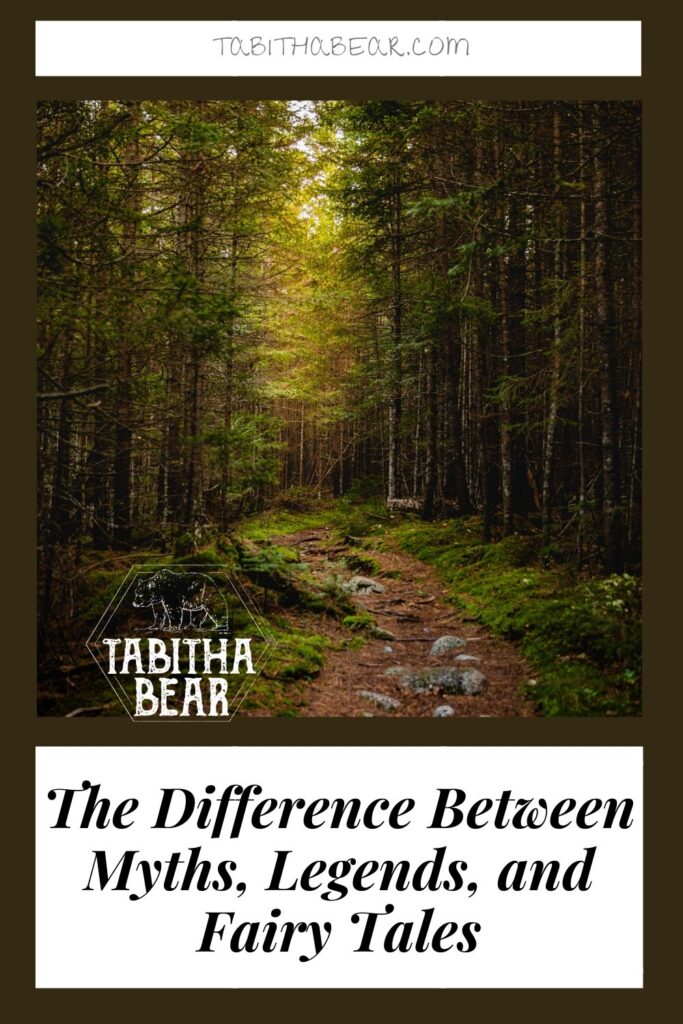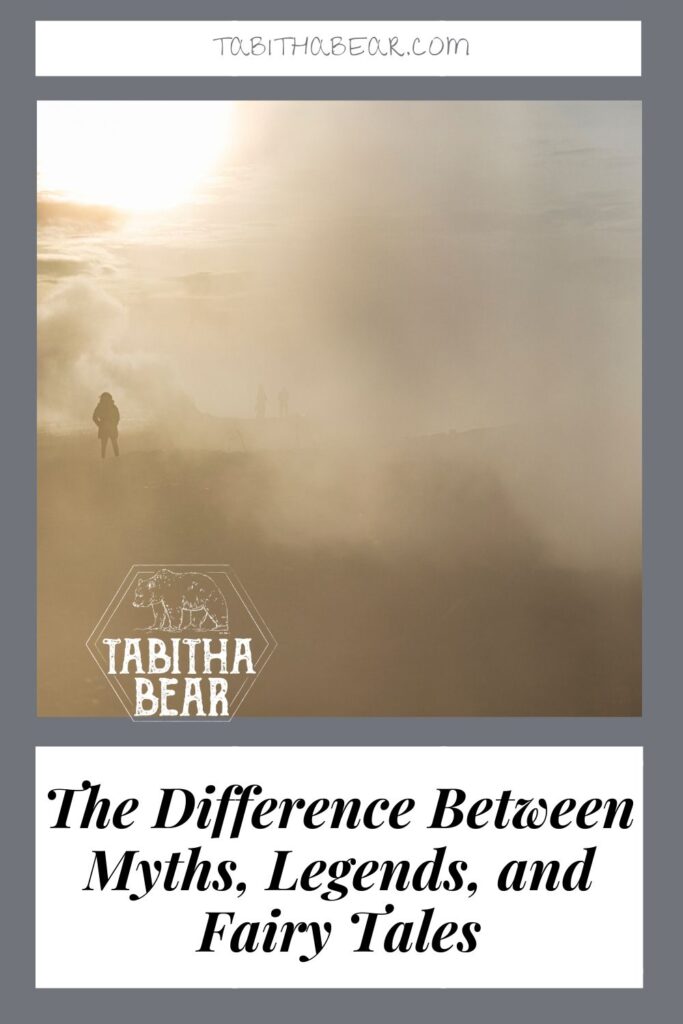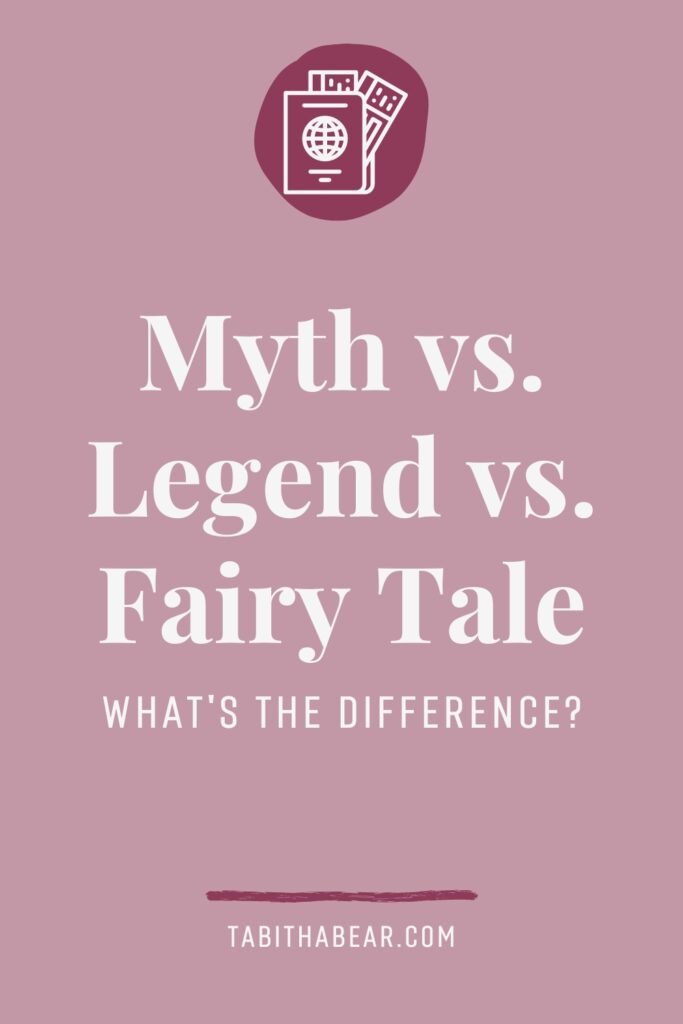
Fairy tales are more than true: not because they tell us that dragons exist, but because they tell us that dragons can be beaten.”
Neil Gaiman
This post may contain affiliate links. I receive a small commission at not extra cost to you. You can find more about that here.
Did you know there’s a different style of story between myth and legend? Are folktales and folklore the same thing? (Spoiler: nope.)
Sometimes (most of the time), we use words interchangeably. Let’s break down the difference between myths, legends, and fairytales. Don’t worry – we’ll also cover fables, folktales & lore, and examples will be provided for everything.
Legends
These stories have some historical fact and accuracy behind them. They’re about real people, places, and/or events. But of course, over time, and through the grapevine and creative listening, the story has become exaggerated.
My favorite example: Dracula.
Dracula was inspired by the infamous Vlad The Impaler. A cruel tyrant who ruled during the 15th century. Although there are many spellings, pronunciations, and translations – Vlad comes from a family with the surname of Dracul.
Even more interesting! If you’re a fan of different vampire stories, and have seen the Underworld movies, the name CORVINUS might mean something to you. Vlad’s second wife was the cousin of Matthias Corvinus, King of Hungary.
If you haven’t seen Underworld, it’s about a group of werewolves following the Corvinus family line. Such a good movie – so sexy.
I think it’s safe to say, nearing the end of the Dark Ages, there were some pretty brutal battles, betrayals, and weird alliances created through marriage and holding neighboring kingdoms children hostage ‘as a sign of loyalty’. There is definitely a lot of inspiration for Dracula.

Myths
Myths are Legends on supernatural steroids. It has some historical elements to it, but it involves gods, demigods, and explanations of natural phenomena.
My favorite example: Greek Mythology.
While some of the stories of the Greek gods are familiar/popular – Hercules, Zeus, Poseidon, Aphrodite, Hades, etc – the mythology also told stories to help explain intense things, such as volcanoes, earthquakes, and men lost at sea.
What are the historical elements? I think the biggest one of all is location. Stories surround certain cities and seas by names we still use today.
Secondly, some of these stories discuss battles, and there is a smidge of truth to them. Whether it be a battle actually happened, or true historical figures were involved, Greek mythology has tiny doses of truth woven into the outrageous powers and unnecessary inbreeding among the gods and goddesses.
Fables
To me, fables are always cute. They may have some historical elements to them, or maybe a splash of magic, but the overall point is that fables teach a specific lesson.
My favorite example: Aesop’s Fables.
It’s just such a classic example, and they’re wonderful.
I do believe The Lion and The Mouse is rather well-known. A lion is awoken by a mouse scurrying around, and the mouse convinces the lion not to eat him because he might be of use to the lion another day. The lion set him free. Some time later, the lion is caught in a trap and tied up with some rope. The mouse happens to be running by, and chews through the rope setting the lion free.
Are there variations to this? Absolutely.
Aesop’s Fables were part of an oral tradition for hundreds of years before they were ever written down. But, the lessons are still there.
Fairy Tales
Who doesn’t love a fairy tale? They usually involve elements of fantasy. I’m talking magic, magical creatures, unicorns, fairies, leprechauns, witches – all of it! The stories also contain good versus evil themes throughout.
My favorite example: Rip Van Winkle!
These also include Snow White, Thumbellina, Cinderella – pretty much the Disney animated movie line-up.
Folktales
Folktales are passed down orally from generation to generation. While they may carry elements of fantasy or proper history, they’re culturally ingrained.
My favorite example: As a Lënape woman, part of growing up was hearing indigenous stories. Whether they were specific to my family or my entire tribe, they were passed down the same way.

Folklore
I saved the biggest for last! Folklore is different from folktales. Folklore is everything. It’s all the tales, proverbs, certain dances, initiations/rituals for different milestones through life – it’s everything that makes up a culture/subculture/group of people.
My favorite example: Vikings! Norse Mythology, certain rituals for battle or marriage, gatherings for milestones in life, along with their stories wraps up nicely into folklore.
Do you have any favorite legends, myths, and/or fairy tales? Let me know!
Did You Know The Differences Between Myths, Legends, and Fairy Tales?
Find more folklore here on the blog (<- link)!

Never Miss An Adventure.

